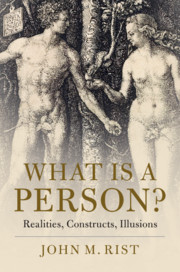Book contents
- What is a Person?
- What is a Person?
- Copyright page
- Contents
- Acknowledgments
- Introduction
- Part I Constructing the ‘Mainline Tradition’
- Part II No God, no Soul: What Person?
- 8 Virtue, ‘Virtue’, Rights
- 9 Descartes on Soul, Self, Mind, Nature
- 10 Personal Identity from Hobbes to Locke
- 11 After Locke
- 12 Sympathy or Empathy: Richardson, Hume, Smith
- 13 Ambiguous Rousseau’s Soul and ‘Moi’
- 14 Kant’s Rational Autonomy
- Part III Toward Disabling the Person
- Part IV Persons Restored or Final Solution?
- Epilogue or Epitaph?
- Appendix The World of Rights Transformed Again
- Bibliography
- Index
9 - Descartes on Soul, Self, Mind, Nature
from Part II - No God, no Soul: What Person?
Published online by Cambridge University Press: 05 December 2019
- What is a Person?
- What is a Person?
- Copyright page
- Contents
- Acknowledgments
- Introduction
- Part I Constructing the ‘Mainline Tradition’
- Part II No God, no Soul: What Person?
- 8 Virtue, ‘Virtue’, Rights
- 9 Descartes on Soul, Self, Mind, Nature
- 10 Personal Identity from Hobbes to Locke
- 11 After Locke
- 12 Sympathy or Empathy: Richardson, Hume, Smith
- 13 Ambiguous Rousseau’s Soul and ‘Moi’
- 14 Kant’s Rational Autonomy
- Part III Toward Disabling the Person
- Part IV Persons Restored or Final Solution?
- Epilogue or Epitaph?
- Appendix The World of Rights Transformed Again
- Bibliography
- Index
Summary
Although ancient and medieval thinkers regularly discuss self-awareness and Augustine emphasizes the importance of the ‘I’ and the ‘first-person’ stance, we have seen that pre-modern accounts of persons involve far more than identifying the personal with consciousness or self-awareness; indeed, they pay specific attention to the nature and activity of the complex subject-substance which is self-aware. Hence a basic concern – not only among dualist Platonists of various sorts – was the relationship between the ‘I’ and the world, including the body; and in the first instance between the ‘I’ and a soul which is not merely a mind yet in some way controls and is responsible for the body. The problem, as we have seen, goes back to the pseudo-Platonic Alcibiades; it disturbed Augustine who came to abandon the identification of the person with the soul but could not explain the nature of the ‘person’ – that strange ‘mix’ of soul and body – and it was temporarily resolved when the ‘mix’ was accepted in the Middle Ages as explicable in Aristotelian terms as the soul’s being the form of the body: I as person am not a soul, but exist as my soul and body, and I can be understood as what I am via that inclusive combination.
- Type
- Chapter
- Information
- What is a Person?Realities, Constructs, Illusions, pp. 91 - 98Publisher: Cambridge University PressPrint publication year: 2019



